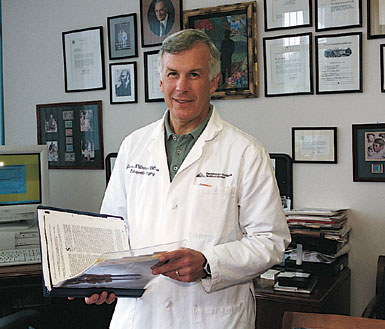Orthopaedics is now a department, with Weinstein as chair
DHMC is gearing up to handle what experts predict will be an onslaught of musculoskeletal illnesses over the next few decades. Orthopaedic conditions—such as back pain; knee, hip, and other joint problems; bone injuries; and arthritis—are the number one cause of disability and physician visits in the U.S. And as the population ages, these problems will require ever more attention from medical professionals.
So Dartmouth has beefed up its resources in orthopaedics— elevating the discipline's status from a section (within the Department of Surgery) to a department and appointing James Weinstein, D.O., as chair.
Weinstein, an advocate of evidence- based medicine and conservative treatment measures for low-back pain, is also head of DHMC's Center for Shared Decision- Making and its multidisciplinary Spine Center.
Concepts: He plans to bring to the new department some of the innovative concepts behind the Spine Center: collecting realtime data, promoting shared decision- making, and bringing together doctors from different disciplines. "The Spine Center is a model for what I think health care needs to evolve into over time, where physicians work across disciplines for the benefit of patients," he says. "We've been very successful in bringing multiple disciplines together in one place, when traditionally people worked in their 'towers.'
. . . Anesthesia worked in one place. Medicine worked in another place. Orthopaedics and neurosurgery worked in separate places." Hundreds of visitors from health-care organizations around the world have come to Dartmouth to see this system, Weinstein adds.
In the new Department of Orthopaedics, Weinstein has established teams of subspecialists —a team focused on spine problems, one for joint-replacement issues, one for sports medicine, and so on. Other plans include integrated clinical, basic, and prevention studies; coordinated teaching initiatives; new models for community and regional patient care; and development of a regional arthritis center.

|
|
Jim Weinstein, the new chair of orthopaedics, established DHMC's Spine Center and
heads the largest surgical trial ever funded by the National Institutes of Health. |
Guru: Weinstein earned his D.O. from the Chicago College of Osteopathic Medicine and did his residency in orthopaedic surgery at Rush-Presbyterian-St. Luke's Medical Center in Chicago. He joined the faculty at the University of Iowa in 1983, becoming director of its spine center in 1987. In the early 1990s, he met outcomes research guru Jack Wennberg, M.D., the director of Dartmouth's Center for the Evaluative Clinical Sciences (CECS). "We talked and he said, 'Why don't you come to Dartmouth for a while and do our program?'" Weinstein recalls. "I came to Dartmouth and went through . . . the second CECS class ever." He returned to Iowa after completing the CECS master's degree in 1995 and became codirector of the office of outcomes evaluation there—but he missed Dartmouth.
So in 1996 he came back. He was appointed a professor of surgery and of community and family medicine and was made director of the surgical outcomes assessment program. The same year, DHMC opened its Spine Center and asked Weinstein to head it, too. He is a member of the board of the American Academy of Orthopaedic Surgeons (AAOS) and a director of the American Board of Orthopaedic Surgery. In 1997, he received the AAOS's highest award for orthopaedic research. He has also been editor-in-chief of the journal Spine since 1993.
In addition, Weinstein heads the largest surgical trial ever funded by the National Institutes of Health (NIH)—a multisite study of back pain based at Dartmouth. The five-year, $14- million trial is comparing surgical to nonsurgical treatments for certain back problems; it is expected to have a major impact on clinical practice and the cost of medical care—a significant concern, since the annual tab for orthopaedic problems in the U.S. is over $250 billion. Weinstein and colleagues were also recently awarded a nearly $7-million NIH grant to study the implications of musculoskeletal diseases in America.
Research prominence: Moreover, Dartmouth is prominent in research to improve joint replacement techniques and to understand regional variations in the treatment of many musculoskeletal conditions.
Weinstein hopes that orthopaedics' new departmental status will help to strengthen what he deems an already strong residency program. Typically, DMS gets some 350 applicants for three available orthopaedic residency slots each year. "I think we have a chance of becoming one of the best orthopaedic programs in the United States," he says.
Will patients notice a difference now that orthopaedics is its own department? Perhaps. "Our goal is to provide better access, better patient care, better outcomes," says Weinstein.
People with orthopaedic conditions "usually get better," he adds. "We can make a difference in people's lives."
Laura Stephenson Carter
If you would like to offer any feedback about this article, we would welcome getting your comments at DartMed@Dartmouth.edu.
